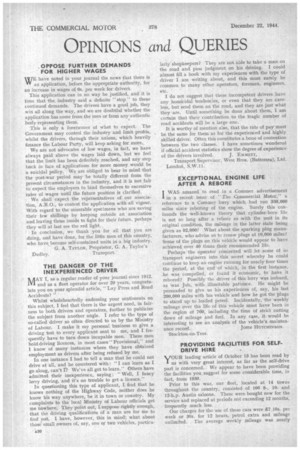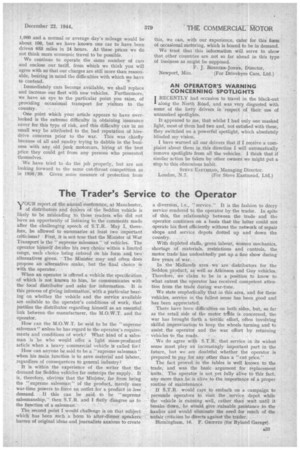OPINIONS and QUERIES
Page 32

Page 35

If you've noticed an error in this article please click here to report it so we can fix it.
. OPPOSE FURTHER DEMANDS FOR HIGHER WAGES
WE have noted in your journal the news that there is vv an application, before the appropriate authority, for an increase in wages of 6s. per week for drivers.
This application can in no way be justified, and it is time that the industry said a definite "stop" to these continued demands. The drivers have a good job, they win all along the way, and we are doubtful whether the application has come from the men or from any authentic body representing them.
This is only a forerunner of what to expect. The Government may control the industry and limit profits, whilst the drivers, through their unions, which heavily finance the Labour Party, will keep asking for more„ We are not advocates of low wages, in fact, we have always paid above the wages laid down, but we feel that the limit has been definitely reached, and any step back in face of applications for more money would be a suicidal policy. We are obliged to bear in mind that the post-war period may be totally different from the present circumstances in the industry, and it is not fair to expect the employers to bind themselves to excessive rates of wages until the fixture position is clarified.
We shall expect the representatives of our association, A.R.O., to contest the application with all vigour. With regard to the miserable specimens who are saving their few shillings by keeping outside an association and leaving those inside to fight for their future, perhaps they will at last see the red light.
In conclusion, we thank you for all that you are doing, and have done, for the little men of this country, who havefiecome self-contained units in a big industry. G. A. TAYLOR, Proprietor, G. A. Taylor's
Dudley. Transport.
THE DANGER OF THE INEXPERIENCED DRIVER
NJAY I, as a regular reader of your journal since 1912, iVI and as a fleet operator for over 20 years, congratulate you on your splendid article, "Lay Press and Road Accidents? "
Whilst wholeheartedly endorsing your sentiments on this subject, I feel that there is the urgent need, in fairness to both drivers and operators, further to publicize the subject from another angle. I refer to the type of so-called driver so often directed to us by the Ministry of Labour. I make it my personal business to give a driving test to every applicant sent to me, and I frequently have to turn down incapable men. These men hold driving licences, in most cases" Provisional," and I know of many instances where they have obtained employment as drivers after being refused by me.
In one instance I had to tell a man that he could not drive at all, and he countered with : "I can learn as I go along, can't 11? We've all got to learn." Others have admitted their inexperience, saying : "Well, I fancy lorry driving, and it's no trouble to get a licence."
In questioning this type of applicant, L find that he knows nothing of the Highway Code, neither does he know his way anywhere, be it in town or country. My complaints to the local Ministry of Labour officials get me nowhere. They point out, I suppose rightly enough, that the driving qualifications of a man are for me to find put. I have, however, this in mind; what about those small owners of, say, one or two vehicles, particu
larly shopkeepers? They are not able to take a man on the road and pass judgment on his driving. I could almost fill a book with my experiences with the type of driver I am writing about, arid this must surely be common to many other operators, foremen, engineers, etc.
I do not suggest that these incompetent drivers have any homicidal tendencies, or even that they are careless, but send them on the road, and they are just what they are. Until something be done about them, I am certain that their contribution to the tragic number of road accidents will be a large one.
It is worthy of mention also, that the rate of pay must be the same for them as for the experienced and highly skilled driver. Often this constitutes a bone of contention between the two classes. I have sometimes wondered if official accident statistics show the degree of experience
of the drivers involved. j. EMMETT,
Transport Supervisor, West Bros. (Battersea), Ltd. London, S.W.11.
EXCEPTIONAL ENGINE LIFE AFTER A REBORE
I WAS amazed to read in a Commer advertisement I in a recent issue of "The Commercial Motor," a reference to a Commer lorry which had run 338,000 miles since reboring of the engine. Surely this confounds the well-known theory that cylinder-bore life is not so long after a rebore as with the unit in its original condition, the mileage in the latter state being given as 82,000? What about the sparking plug manufacturers, who advise us to renew plugs at 10,000 miles? Some of the plugs on this vehicle would appear to have achieved over 40 times their recommended life.
Perhaps the operator concerned will let some of us transport engineers into this secret whereby he could continue to keep an engine running for nearly four times the period, at the end of which, in the first instance, he was compelled, or found it economic, to have it rebored? Possibly the driver of this lorry was imbued, as Was Job, with illimitable patience. He might be persuaded to give us his experiences of, say, his last 200,000 miles with his vehicle and how he got the plugs to stand up to leaded petrol. Incidentally, the weekly mileage over the life of this vehicle must have been in the region of 700, including the time of strict cutting down of mileage and fuel. In any case, it would be interesting to see an analysis of the vehicle's mainten
ance record. JOHN HUTCHINSON. Stockton-on-Tees.
PROVIDING FACILITIES FOR SELFDRIVE HIRE
YOUR leading article of October 13 has been read by us with very great interest, as far as the self-drive part is concerned. We appear to have been providing the facilities you suggest for some considerable time, in fact, from 1930.
Prior to this war, our fleet, located at 14 towns throughout the country, consisted of 100 8-, 10and I2-h.p. Austin saloons. These were. bought new for the service and replaced at periods not exceeding 12 months, frequently much less.
Our charges for the use of these cars were 27 10s. perweek or 30s. for 12 hours, petrol extra and mileage unlimited. The average weekly mileage was nearly
1,000 and a normal or average day's mileage would be about 100, but we have known one car to have been driven 653 miles in 24 hours. At these prices we do not think more economic travel to be possible.
We continue to operate the same number of cars and enclose our tariff, from which we think you will agree with us that our charges are still more than reasonable, bearing in mind the difficulties with which we have to contend.
Immediately cars become available, we shall replace and increase our fleet with new vehicles. Furthermore, we have an eye to the particular point you raise, of providing occasional transport for visitors to the country.
One point which your article appears to have overlooked is the extreme difficulty in obtaining insurance cover for this type of risk, and this difficulty can in no small way be attributed to the bad reputation of hiredrive concerns prior to the war. This was chiefly because of all and sundry trying to dabble in the business with any old junk motorcars, hiring at the best price they could get from any persons who presented themselves.
We have tried to do the job properly, but are not looking forward to the same cut-throat competition as in 1938/39. Given some measure of protection frcnn this, we can, with our experience, cater for this form of occasional motoring, which is bound to be in demand.
We trust that this information will serve to show that other countries are not so far ahead in this type of business as might be supposed.
F. J. BOSHIER-JONES, Director, Newport, Mon. (For Drivehyre Cars, Ltd.) AN OPERATOR'S WARNING CONCERNING SPOTLIGHTS I RECENTLY had occasion to travel in the black-out along the North Road, and was very disgusted with some of the lorry drivers in respect of their use of unmasked spotlights.
It appeared to me, that whilst I had only one masked light, most of them had two and, not satisfied with these, they switched on a powerful spotlight, which absolutely blinded my vision.
I have warned all our drivers that if I receive a-complaint about them in this direction I will automatically remove spotlights from all the vehicles. I think that if similar action be taken by other owners we might put a stop to this obnoxious habit.
STEVE EASThLEAD, Managing Director.
London, N.7. (For Steve Eastmead, Ltd.)




















































